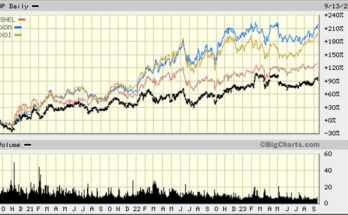Note: Musings from the Oil Patch reflects an eclectic collection of stories and analyses dealing with issues and developments within the energy industry that I feel have potentially significant implications for executives operating oilfield service companies. The newsletter currently anticipates a semi-monthly publishing schedule, but periodically the event and news flow may dictate a more frequent schedule. As always, I welcome your comments and observations. Allen Brooks
Energy Thoughts Based on December Events
December in the
At the Montreal Conference of Parties representing the countries that have signed the Kyoto Protocol, the mood was one of consternation as the delegates began to truly understand that the United States was not going to be a party to this process. The difference between the pubic and private views of European delegates became clearer as the conference progressed. Publicly, they began to focus on 2009 and the next
The way forward for controlling emissions will be more complex than previously thought, but will ultimately reflect two tracks – the
Under the
In the interim,
For the environmentalists to gain further support, they will have to make some concessions. They were recently successful in battling to block a provision in the Defense appropriations bill that would have allowed drilling in the Alaskan National Wildlife Refuge (ANWR). The price for winning this battle may be that they have to become supporters of increased nuclear power, LNG and even clean-coal to meet
The decadenal White House conference on ageing in the
While these long-term trends are beginning to emerge, a more immediate issue may be determining the significance of the early December playing by Al Jazeera of a videotape containing comments from al Qaeda’s number two leader, Aymen al-Zawahiri. Portions of the tape were played in September when the tape was initially sent to Al Jazeera, but the full tape was not played until December 7. The significance of the airing of a two-month old tape has been debated, but only recently have analysts begun to think of alternative explanations. The most significant theory is that the tape’s exhortation to attack the oil industry may have actually been a message directed at
The statement did not say exactly where the oil infrastructure was that is to be targeted. It was quickly assumed that al Qaeda followers would attempt to carry out this mandate where they could easily do so; meaning within their local reach, namely the
Even though there has not been a terrorist attack in the
The events of December 2005 have set the stage for an interesting 2006. We still contend that the fallout from Hurricanes Katrina and Rita mark a watershed in
OPEC and China
Sheik Ahmad Fahd al-Ahmad al-Sabah, Kuwait energy and oil minister and president of the Organization of Oil Exporting Countries (OPEC), is leading a delegation of OPEC members to China this week for talks about how to strengthen their relations.
In 2001, Saudi Aramco, the world’s largest oil company based on production volumes, agreed to expand a refinery in
If the members of OPEC are prepared to use their checkbooks, which are overflowing with cash with global oil prices in the $55-$65 per barrel range, to build refineries in
Oil Traders and Short-term Memory
It has been interesting to watch the gyrations in crude oil prices over the past two months in response to changing weather and economic conditions. The
What appears to have moved crude oil and natural gas futures prices has been the weather in the northeastern and central regions of the
AccuWeather is predicting a colder than normal winter season for a portion of the upper northern region of the country this winter, but it anticipates about normal winter weather for the rest of the country. The forecast is based somewhat on analogs winter temperatures in years with above-average hurricane activity such as experienced this year. Those years have generally produced cooler-than-normal winter temperatures and especially for the month of March.
Exhibit 1. AccuWeather Winter Forecast

Source: AccuWeather.com
The AccuWeather forecast was initially in line with the first revised forecast from the National Weather Service (NWS), which operates under the auspices of the National Oceanic and Atmospheric Administration (NOAA). The initial NWS forecast called for warmer-than-normal temperatures this winter for most of the country, but now they see a greater area where temperatures will fluctuate around normal. The government weather service doesn’t actually prepare a forecast, but rather provides probabilities of temperatures being above- or below-normal, or merely normal.
What has been interesting has been the build in crude oil inventories in the past few weeks, along with a general rise in petroleum product inventories, despite a slightly colder start to the winter season. While crude oil and petroleum product futures prices have bounced around during the past 60 days, the trend in natural gas prices has reflected a strong upward bias. This rise is the result of a lack of alternative energy sources combined with the fallout from the hurricanes that have shut in a substantial volume of
We thought it would be interesting to plot the movement of spot crude oil prices against the low temperature readings for
Exhibit 2. Temperatures Correlate Well With 3 Day Lag

Source: EIA; PPHB
Exhibit 3. Temperatures vs. Spot Oil Prices

Source: EIA; PPHB
According to meteorologist Joe Bastardi of AccuWeather, through December 20, there had only been four days of above-normal temperatures in
On the other hand, a new three-month forecast from WSI, an affiliate of Energy Security Analysis, Inc. (ESAI) of
Very significantly, WSI sees warmer-than-normal temperatures everywhere but in the Southwest region for the month of March. As a result, ESAI foresees end-of-winter natural gas storage levels much higher than presently anticipated that would likely send gas prices crashing. So how is it that we can have two well-regarded weather forecasters coming to opposite conclusions about this winter’s weather, and especially the weather for March producing diametrically opposite conclusions for natural gas traders and investors? Both forecasters look at the current weather conditions, the weather patterns that are developing and then search for historical analogs to develop their forecasts. Obviously, each has come to a different conclusion about which analog years to use in modeling their winter weather forecasts. The direction of energy prices over the next several months, and the success of energy investors and commodity traders, will depend on whether they pick the correct forecast.
Clean Air or Global Warming
An article in Nature magazine presents a potential Hobson’s choice for people: A reduction in haze from human causes may accelerate warming of the earth’s atmosphere. The pollutants in the air act to absorb and scatter sunlight reducing the impact on warming of the earth’s atmosphere. According to Jim Coakley, a professor of atmospheric sciences at
The study was performed by a group of scientists working for government agencies in
The new estimate of the cooling effect of haze is at the high end of ranges cited by the Intergovernmental Panel on Climate Change, the study group formed by the United Nations Environment Program and the World Meteorological Organization. According to the researchers, “Consequently, continued aerosol emission controls may lead to a stronger warming than current model predictions.”
According to Dr. Coakley, global temperatures are already about seven-tenths of a degree Fahrenheit higher than they were in the 1980s. Further warming may mean that within decades, summers will be about a month longer than they are now. There are a number of implications for energy from the lengthening of summer. By definition, winter would be shorter reducing heating demand. On the other hand, in warmer regions where air conditioning is used, the longer season could mean more energy demand. In the face of higher energy costs, people are generally more able to tolerate warmer temperatures rather than colder ones, so we might expect the net energy impact to be a reduction in consumption. Additionally, the longer growing season global warming would bring might lead to increased fertilizer and farming energy needs. There are numerous other energy impacts from this changed weather pattern that we have not enumerated. However, it is interesting, and important, to contemplate the net energy impact of global warming.
A Larger China
Last week the National Bureau of Statistics announced a revision to its estimate of the size of the Chinese economy. Based on the revised figures, the Chinese economy at the end of 2004 is now estimated to have been 15.988 trillion yuan, or $1.932 trillion based on a year-end exchange rate of 8.276 yuan to the dollar, or 16.8% larger than prior estimates. This makes
The new Chinese economy estimate was developed following the first economic census performed in decades. The year-long survey was performed by 13 million data-gatherers, or one in every hundred Chinese. The statistics suggest that the service sector (real estate, transportation and restaurants, etc.) accounts for 40.7% of Gross Domestic Product (GDP) in contrast to the prior assumption of a 31.9% weighting. On the other hand, the manufacturing sector’s importance was reduced to 46.2% from its prior 52.9% weighting. The agriculture and related activities sector was lowered to 13.1% from its prior weighting of 15.2%.
The understanding that the makeup of the Chinese economy is different from previous beliefs has altered certain perceptions about the future challenges the economy faces. First, almost the entire increase in the size of the Chinese economy was accounted for by the service sector. This has important implications for job growth. Second, economists now believe the Chinese economy faces less risk of overheating because the impact of certain risk measures such as the ratio of bad loans to GDP have improved. Third, the sustainability of growth of the Chinese economy is now more assured with the larger service sector. Since the economy is now less reliant on export-oriented industries, the government may let the value of the yuan float higher against foreign currencies with less fear of damage to the economy.
Two other conclusions come from the new economic statistics. One is that the significant growth in energy consumption over the past several years may be explained by the growth of the service sector and its electricity needs that were under-supplied because of the lag in construction of new power and hydroelectric plants. The better supply/demand balance in the electricity sector may reduce diesel oil demand. Second,
Russia
After a number of years of demonstrating above average oil production growth,
The lower oil production growth rate in 2005 and 2006 is largely attributable to the fallout from the political turmoil surrounding the dismantling of Yukos last year, as the Russian government undertook the re-nationalization of its oil and gas industry. This re-nationalization has been undertaken to strengthen the power of Russian President Vladimir Putin.
When Putin began to gather political strength, he tacitly allowed certain Russian businessmen to amass huge ownership positions in important companies in the economy as long as they agreed not to challenge him politically. With these positions, the businessmen saw their wealth explode as investors bid up the stock prices of their companies. Buoyed by their newfound wealth, some of these Russian oligarchs began to flex their political muscle in direct disregard of their prior agreement with the government to remain non-political. As they became more outspoken and threatened the current Russian leadership, political and economic retaliation became more likely. The most high-profile response to the threat from these oligarchs was the income tax evasion and fraud charges leveled against Mikhail Khodorkovsky, the head of OAO Yukos (YUKOY.PK-OTC). Not only did Khodorkovsky wind up being sentenced to a Siberian jail for eight years, but the prize asset of his company was confiscated and sold to a local, state-controlled Russian oil company.
As
That effort has recently emerged. Gazprom was already a publicly traded company with the government owning over 50%. Through recent maneuvering, the Putin government was able to engineer an increase in its control over Gazprom and enacted legislation that should ease restrictions on western investor ownership in the company. Fundamentally, Gazprom is moving forward with its effort to become the dominant natural gas supplier to
Exhibit 4.

Source: Gazprom
Important in this effort is the construction of a pipeline between
In order to give Rosneft, which is contemplating an initial public offering in 2006, equal political standing, Putin reportedly offered the chairmanship to former U.S. Commerce Secretary Donald Evans, a long-time Texas oil-man and close friend and advisor to President George W. Bush. Reports were that Evans considered the position, but ultimately turned it down. While we don’t know for sure, but based on our past dealings with Mr. Evans, we suspect he saw the offer as merely an attempt to use his own stature and his close association with President Bush as a tacit endorsement of the legitimacy of Rosneft.
Mr. Putin is trying to cap off a successful 2005 by providing high-level global credibility to his two energy firms before they march forward in furtherance of his geopolitical aims. For example, there was another meeting in
A tight oil and gas supply market should give the two Russian oil and gas companies increased bargaining power in world markets, adding to the financial and political war chests of Putin and the country. The Evans job offer rejection means that Putin will need to find another high-profile executive for Rosneft, especially as it moves toward an IPO. We are sure there are candidates out there, but probably none with the political stature that Evans would have brought. Stay tuned for the next announcement, but understand that it will not paper over the questionable legal maneuvers used to build Rosneft, or Putin’s ambitions for the company.
Is a Gulf of Mexico
In early December, officials from the NOAA National Weather Service went to
Inouye said, “It is with great pride that we announce
Exhibit 5.

Source: NOAA
In Hawaii, the civil defense organization has established an emergency operations center in every county, a statewide siren system, placed evacuation maps in the phone books, conducts regular drills and has created public education programs, all designed to prepare the state and its citizens for a possible tsunami. But how prepared are the other coastal regions of the
Exhibit 6.

Source: NOAA
What about the possibility of a tsunami hitting the
Is The Pain of Separation Too Great?
On December 16, ExxonMobil (XOM-NYSE) and its retiring chairman, Lee Raymond, spun a new deal to keep him involved in the company’s affairs. According to an SEC filing, Mr. Raymond has agreed to assist in the transitioning of major strategic corporate relationships and to participate in external activities and events as requested by ExxonMobil’s new Chairman in exchange for a fee of $1 million, payable in a single installment in December 2006, plus reimbursement of Mr. Raymond’s reasonable expenses incurred in providing such services.
In addition to this portion of the agreement, ExxonMobil will provide protective services to Mr. Raymond and his wife for a two-year period. This service will consist of providing a security system at Mr.Raymond’s home, personal security people, a car and personal security driver and the use of ExxonMobil or chartered aircraft for ExxonMobil business and personal travel. Mr. Raymond will reimburse ExxonMobil for personal use of the automobile and planes in accordance with IRS regulations. This agreement and provision of services is in addition to the normal retirement benefits earned by Mr. Raymond and additional services usually provided to former chairmen of the company such as provision of an office and secretarial support.
While we do not begrudge Mr. Raymond his million dollars, we do wonder about the transition services he needs to perform for ExxonMobil, given that he had already extended his retirement date by one year to facilitate a smooth management succession. Was this payment really about services to be rendered or did it reflect Mr. Raymond’s reluctance to yield the influence associated with one of the most powerful corporate jobs in the world?
Contact PPHB:
1900 St. James Place, Suite 125
Houston, Texas 77056
Main Tel: (713) 621-8100
Main Fax: (713) 621-8166
www.pphb.com
Parks Paton Hoepfl & Brown is an independent investment banking firm providing financial advisory services, including merger and acquisition and capital raising assistance, exclusively to clients in the energy service industry.


